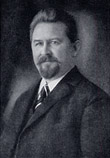Fritz Graebner (*1877 + 1934) was born in Berlin in 1877. He studied History and completed his PhD thesis in 1901. Since 1899 he worked at the Ethnological Museum (formerly: Staatliches Museum für Völkerkunde) in Berlin, where he was a colleague of Bernhard Ankermann.
In 1907 Graebner took up a position at the newly founded Rautenstrauch-Joest-Museum for Ethnology in Cologne. Moreover, he began to publish the anthropological journal Ethnologica.
In 1911 Graebner finished his habitation thesis. He planned a research trip leading him to Australia, where he was interned during World War I. In 1919 he was released.
After his return to Germany Graebner also began lecturing at the university in Cologne in 1921. Four years later he became head chairman of the Rautenstrauch-Joest-Museum for Ethnology.
Since 1926 he held a honorary professorship at the university in Cologne. Due to health problems Graebner was retired in 1928. He eventually returned to Berlin where he died in 1934.
Graebner was not only an expert for museum work but, besides Ankermann, also a representative of Kulturkreislehre. He was a diffusionist, advocated a historical approach and had a strong interest in material culture. His regional focus was on Oceania.
Graebners book about the methods of Ethnology (published in 1911) not only had a strong impact on Anthropology in german-speaking countries in early 20th century but also upon the theoretical assumptions of the Vienna School.
(This text based on Alsayad/Seiler (eds.) 2005: Ethnologen-Lexikon. Berlin: WeißenseeVerlag, by courtesy of WeißenseeVerlag and Sibylle Alsayad; photo source: http://anthropos6.files.wordpress.com/2010/04/fritzgraebner.jpg)
Short Portrait: Fritz Graebner

Fritz Graebner
 further information
further information
 Links
Links
